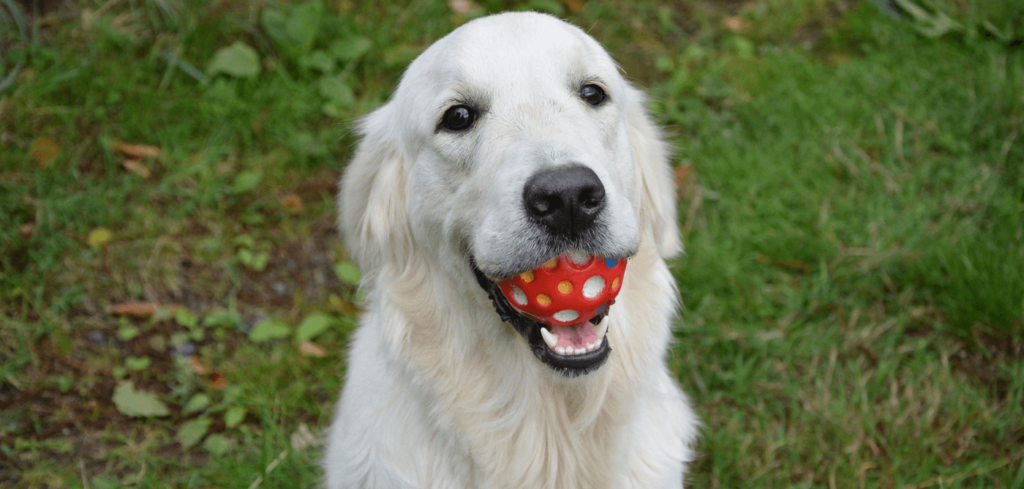
I’m sure you love seeing your dog smile while he (or she) plays…
As a dog parent, it just gives you a warm feeling, and it’s one of the best parts about owning a dog…
But sometimes, as they play, our dogs can do things that shock or even frighten us, and this includes eating things that they shouldn’t be eating…
So if your dog ate a rubber ball, and now you’re wondering if his health is in danger, you’re in the right place…
This article is going to cover what you need to know to ensure the health and safety of your dog, and we’ll be doing that by going over the following information…
- My Dog Ate A Rubber Ball – Can You Tell My Why?
- Can Dogs Poop Out Rubber?
- Is It Dangerous If My Dog Ate A Rubber Ball?
- What Treatment Can I Expect From The Vet?
- How To Prevent Your Dog From Eating Rubber Balls In The Future
In the end, you’ll know if your dog’s health is in danger after eating a ball, and you’ll know what you need to do to ensure your dog stays safe…
Let’s begin by discussing why dogs eat objects like rubber balls in the first place…
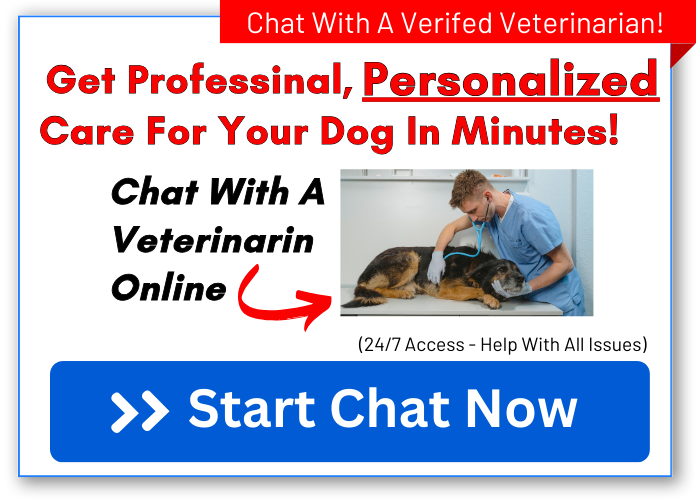
My Dog Ate A Rubber Ball – Can You Tell My Why?
There are a variety of reasons why dogs will eat rubber balls, and one of those reasons is that dogs are curious and love exploring…
When dogs explore, they lead with their nose or mouth. So it’s not uncommon for them to eat or swallow foreign objects (like socks and toys)…
On top of that, when dogs are in the puppy stage, they will try putting everything into their mouths to test out what’s acceptable and what’s not…
They basically try to figure out what will happen when they chew certain items like sticks, shoes, and other objects…
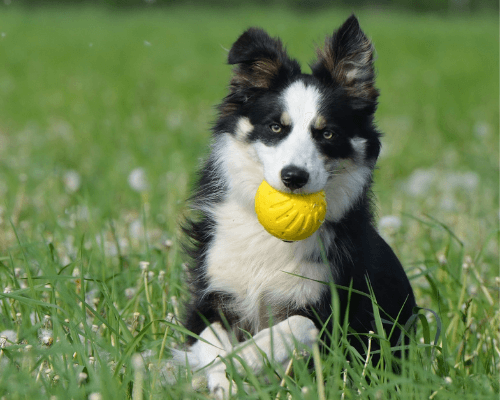
This type of exploration is known as Neurosensory Exploration, and even though most dogs will grow out of the Neurosensory Exploration stage…
…there are some breeds such as Pit Bulls, Labs, and Golden Retrievers, that will continue to eat toys and rubber balls throughout life.
Another reason why your dog may eat a rubber ball is due to boredom…
If a dog is feeling lonely or understimulated, then he or she might engage in misbehaviors such as eating and shredding…
These behaviors are your dog’s way of telling you that he or she misses you and needs more attention from you…
And if you suspect that this is the case, I recommend you check out this because it will keep your dog happy, healthy, and entertained all day long…
Dogs can also eat rubber balls because they feel the need to dominate their toys…
This domination behavior stems from how dogs behaved in the wild, as dogs would dominate one another to establish the pack order…
Dogs also dominate smaller animals that they catch and kill for food. So, dogs will sometimes dominate their toys by shredding and eating them, and rubber balls are no exception…
Last, Pica is another potential reason why your dog ate a rubber ball. Pica is a disorder that causes dogs to have cravings for things that have absolutely no nutritional value…
Along with rubber balls, dogs will eat paper, rocks, underwear, and other items around the house.
Can Dogs Poop Out Rubber?
If your dog has eaten a rubber ball, you’re probably wondering if everything will be okay and if the problem will resolve itself…
You might be asking yourself… Will my dog just poop out the ball, or do I need to rush to the veterinarian. Well, the answer is that it depends on several factors…
If the ball that your dog ate is made from Thermoplastic Rubber (a type of rubber that is non-toxic)…
…and your dog has only consumed a small bit of it, then your dog will probably be able to pass the rubber through the intestines.
Even so, you still need to watch your dog for signs of trouble, and you should look out for symptoms such as:
- Straining to pass stool
- Bloody stools
- Lethargy
If you notice your dog having any of these symptoms, then you should contact a veterinarian immediately…

Is It Dangerous If My Dog Ate A Rubber Ball?
If your dog consumed an entire rubber ball or if he or she consumed more than a small piece of nontoxic rubber…
There are some serious and potentially life-threatening things that can happen. First of all, swallowing a ball can create a choking hazard for your dog…
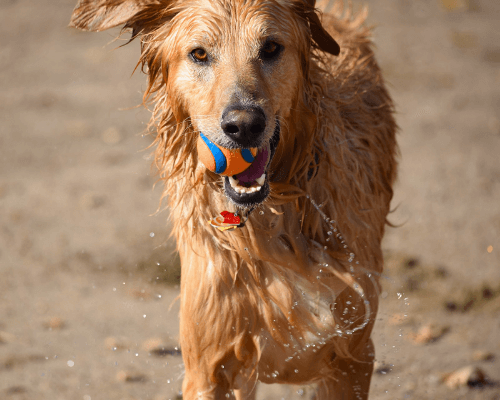
So you’ll want to examine your dog closely after the incident occurs and make sure that his or her airway is not being blocked…
Another thing that might happen is that your dog starts throwing up, and the ball might come up as a result (which is a good thing)…
It’s also possible that the ball becomes stuck in your dog’s stomach…
Items that are indigestible will oftentimes get stuck in a dog’s stomach, especially if the object is too large to get in your dog’s intestines…
These objects that stay stuck in your dog’s stomach can cause things like chronic vomiting and be very discomforting for your dog…
One of the worst things that can happen if your dog swallows a ball is an intestinal blockage. An obstruction in your dog’s intestines is extremely serious, and potentially life-threatening…
It will require surgery to remove the object, and it’s also sometimes difficult to notice early on…
That being said, some of the signs you’ll want to look out for indicating an intestinal blockage include…
- difficulty passing stool
- vomiting
- lethargy and inactivity
- loss of appetite
- signs of pain or discomfort
- dehydration
- bloating
Because of the potential for serious medical problems, you should contact a veterinarian immediately if your dog ate a rubber ball…

What Treatment Can I Expect From The Vet?
If it hasn’t been too long since your dog ate the ball, and if your dog is a large breed, the vet might ask you to wait and see if your dog vomits up the ball or poops it out…
Otherwise, the vet might want you to come in and have your dog undergo an endoscopy…
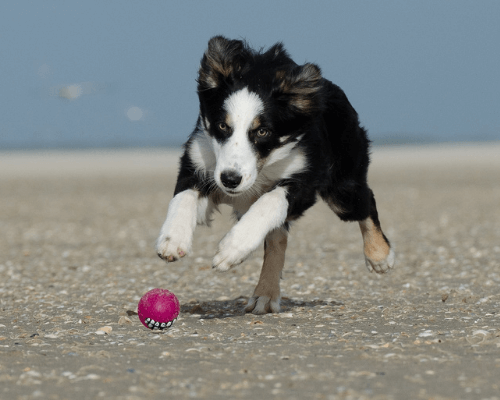
An endoscopy is when the vet puts a scope down your dog’s throat and examines his or her stomach…
During the endoscopy, the vet might be able to remove the ball if he or she discovers that it’s stuck in your dog’s stomach…
That being said, if the vet determines that your dog is suffering from an intestinal blockage, then your dog will have to undergo surgery to have the blockage removed.
How To Prevent Your Dog From Eating Rubber Balls In The Future…
There are a variety of measures you can implement to prevent your dog from eating rubber balls in the future…
First of all, if your dog is communicating to you that he or she is bored, under-stimulated, or lonely, give your dog lots of extra attention…
Tire your dog out by playing games, going on walks, and spending time at the dog park. I also recommend you check out this if you want to keep your dog entertained all day in a healthy way…
If your dog is an aggressive chewer, you should purchase durable toys designed for tough chewing and watch your dog closely when he plays with them…
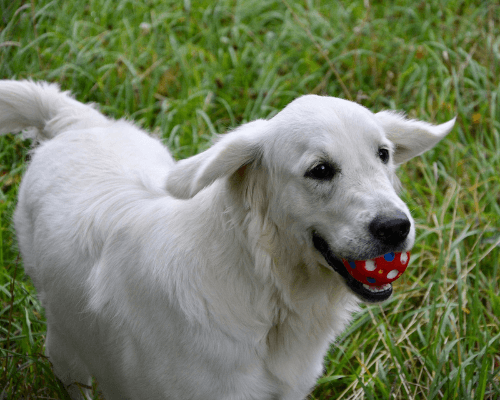
Sometimes, even the most durable toys can eventually be destroyed, so it’s imperative that you also watch for signs of wear and tear…
…and when you see that the toys are starting to come apart, throw them away and replace them.
Another option is to avoid toys altogether and give your dog things like Organic bones to chew on…
Organic bones are completely safe as well as being edible, and you won’t have to worry about choking hazards or medical emergencies occurring while you’re away from your dog…
Last, you should focus on training your dog to be more obedient…
Teaching your dog to follow commands such as ‘Leave it!” or ‘Drop it!’ can go a long way in keeping your dog safe…
And if you need help training your dog, there are a number of great programs out there, but the one I recommend is Brain Training For Dogs…
I like it because it’s easy to follow, it works, and you can access the program from the comfort of your own home…
If you’d like to learn more about how Brain Training For Dogs can help you teach your dog to be more obedient and well-behaved, click the link below…

Final Thoughts…
If your dog ate a rubber ball, it has the potential to cause some pretty serious health issues…
Because of that, it’s best to contact a veterinarian as soon as possible whenever your dog swallows any type of foreign object…
Hopefully, your dog will be able to vomit up or poop out the ball without any problems. But, if your dog does need additional treatment…
… a veterinarian is the best person to examine the problem and then to determine how to proceed from there.